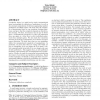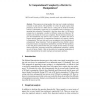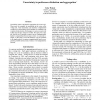687 search results - page 3 / 138 » On The Complexity of Manipulating Elections |
110
click to vote
ATAL
2008
Springer
15 years 3 months ago
2008
Springer
Complexity theory is a useful tool to study computational issues surrounding the elicitation of preferences, as well as the strategic manipulation of elections aggregating togethe...
133
click to vote
CLIMA
2010
15 years 1 months ago
2010
When agents are acting together, they may need a simple mechanism to decide on joint actions. One possibility is to have the agents express their preferences in the form of a ballo...
106
click to vote
CORR
2006
Springer
15 years 1 months ago
2006
Springer
We study the complexity of influencing elections through bribery: How computationally complex is it for an external actor to determine whether by paying certain voters to change t...
AAAI
2007
15 years 4 months ago
2007
Uncertainty arises in preference aggregation in several ways. There may, for example, be uncertainty in the votes or the voting rule. Such uncertainty can introduce computational ...
133
click to vote
CORR
2012
Springer
13 years 9 months ago
2012
Springer
All previous work on “candidate-control” manipulation of elections has been in the model of full-information, simultaneous voting. This is a problem, since in quite a few real...



